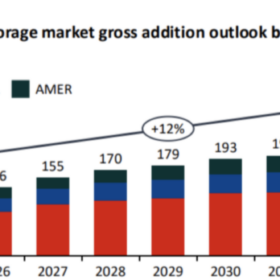Bi-directional charging allows electric vehicle (EV) drivers to charge the car from the grid or from their solar system, and then also send electricity back to the grid.
“Vehicle-to-grid charging is a real game-changer that could turbocharge the EV market in Australia by allowing EV drivers to send electricity back to the grid from their car and get rewarded for that,” said Chau Le, General Manager, E-mobility, Origin.
“We are excited to be at the forefront of pioneering this technology with the trial of this Aussie first vehicle-to-grid bundle that makes it simple and easy for drivers to unlock benefits through access to free charging.”
Powered by Origin’s Virtual Power Plant, drivers will simply plug in most days and let the tech do the rest. For eligible customers who participate in the trial, the fully automated process will provide free charging at home for every kilometre driven during the EV subscription up to an estimated 24,000 km per year.
The Electric Vehicle Council estimates a typical Australian driving 12,000 km a year spends about $500 annually on electricity with an EV on a standard electricity tariff, or $2,500 annually on fuelling with a petrol car. With free charging at home based on these estimates the same driver could save between $500 and $2500 annually.
Origin is currently taking expressions of interest for the trial which will commence in 2026 with pricing available at under $800 a month after tax savings. The trial is limited to 50 customers and eligibility criteria will apply.
Eligible customers will receive a BYD Atto 3 on subscription (valued at RRP $39,900 before on-road costs), a bi-directional StarCharge V2G Halo charger (RRP $6,000AUD) and access to an Origin smart tariff with free home charging.
“This trial will help us understand the impacts of bi-directional charging on customer behaviour, impacts to their EV, and test how to best share value back with customers,” Le said.
Origin already provides EVs to over 1,600 drivers including through flexible subscription plans, and provides smart charging to electricity customers through the EV Power Up energy plan.
The month-by-month flexibility of Origin’s EV subscriptions allows eligible customers to access salary packaging and Fringe Benefits Tax exemption for EVs through their employer, while avoiding being locked into long term vehicle lease agreements.
Sajid Hasan, Chief Product Officer, BYD Australia said: “The principles of V2G and what it will translate into for our Australian customers perfectly aligns with our mission to provide ‘innovation for a better life’ and to ‘cool the earth by 1 degree’.”
“BYD is excited to partner with Origin to pioneer this technology in Australia to redefine what Electric Vehicle ownership means and to shed light that there is much more to an Electric Vehicle than just mobility.”
Kouki Xiang, CEO, StarCharge APAC said: “Vehicles are no longer just part of the transport network – with EVs and bi-directional charging technology, they’re becoming an active part of the energy network. Through V2G, every car becomes a mobile energy asset.”
“We’re excited to be part of this collaboration with Origin and BYD to accelerate the adoption of V2G technology in Australia.”
What is vehicle-to-grid (V2G) charging?
V2G will unlock savings for EV drivers by turning their car into a battery on wheels.
Drivers will be able to charge from the grid when wholesale electricity is cheap, like during the day when there is often high volumes of solar generated electricity in the grid.
They will then be able to send some of the energy stored in their EV battery back to the grid at peak times when wholesale electricity is expensive.
This can help reduce the grid’s reliance on fossil fuel plants, with EV owners able to be rewarded for sending some of that stored energy back to the grid.






By submitting this form you agree to pv magazine using your data for the purposes of publishing your comment.
Your personal data will only be disclosed or otherwise transmitted to third parties for the purposes of spam filtering or if this is necessary for technical maintenance of the website. Any other transfer to third parties will not take place unless this is justified on the basis of applicable data protection regulations or if pv magazine is legally obliged to do so.
You may revoke this consent at any time with effect for the future, in which case your personal data will be deleted immediately. Otherwise, your data will be deleted if pv magazine has processed your request or the purpose of data storage is fulfilled.
Further information on data privacy can be found in our Data Protection Policy.